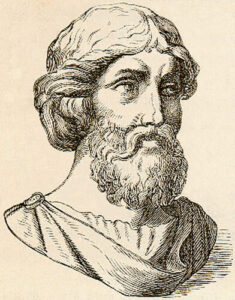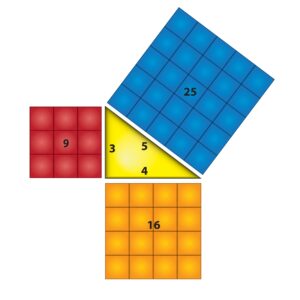Pythagoras
Grades 9+
 After a long trip from Athens, Orion, a math prodigy and an aspiring seeker of wisdom, had reached Pythagoras’s school in the small town of Croton, in southern Italy. He was determined to enroll in the hallowed institution of the great philosopher. Orion could barely contain his excitement. If he was accepted into the school, he would help unlock the mysteries of the cosmos.
After a long trip from Athens, Orion, a math prodigy and an aspiring seeker of wisdom, had reached Pythagoras’s school in the small town of Croton, in southern Italy. He was determined to enroll in the hallowed institution of the great philosopher. Orion could barely contain his excitement. If he was accepted into the school, he would help unlock the mysteries of the cosmos.
He knocked on the gate and was ushered into a room where a clerk sat. He gave Orion the instructions. To join, Orion must swear an oath of secrecy and silence. Pythagoras believed that silence was of the utmost importance. He stipulated that any who sought to join his school must remain mute for five years. This had a dual purpose. One, silence encouraged purity and taught self-restraint. Two, he wanted to ensure his students could keep the cult’s secrets.
The clerk handed him a sheet of parchment. On it was written the oath of secrecy he needed to take before he was allowed to enter. Orion quickly read it over, and with a steady hand, signed his name at the bottom, the ink drying almost instantly.
Inside the school, the boy also had to accept and adopt a stringent lifestyle of abstinence. Unflinching in his commitment, the boy accepted the terms. He had to give up sex, meat, and, of course, speech.
 Pythagoras had two groups of followers: the akousmatikoi and the mathematikoi. The latter were his most devoted and most loyal disciples. They were told the secrets of advanced mathematics. Pythagoras had formed a religion based on numbers. His theorems were sacred.
Pythagoras had two groups of followers: the akousmatikoi and the mathematikoi. The latter were his most devoted and most loyal disciples. They were told the secrets of advanced mathematics. Pythagoras had formed a religion based on numbers. His theorems were sacred.
At last, Orion met the great philosopher. Pythagoras sat all in white, a golden wreath on his head. Orion, seated on the floor behind the other learners, trembled as the master’s soft voice carried across the room. Pythagoras spoke of the mysteries of the universe and of how numbers could be used to unlock them. He said numbers were the foundation of reality.
Numbers, he said, went beyond the study of math and philosophy. He reminded his followers that numbers were a source of worship and admiration, with each number containing a unique significance: 7 symbolized wisdom, and 8 was a sign of justice. But no number was more holy than the 10, which they literally prayed to.
Numbers may not be the foundation of reality, as Pythagoras claimed, but base 10 has become the foundation of math for most of the world.
Pythagoras Activity 1
Find the words below in the essay. Then fill in the blanks of the noun test. For example:
runners
The ______________________.
The runners.
Some words will not fit. Skip those. Don’t identify their part of speech. For example:
enjoy
The enjoy
Write N after all the words that are nouns. Don’t worry about the others. Use the noun test: noun = the ______
1. long | 4. Orion | 7. philosopher | 10. secrecy | 13. They |
2. Athens | 5. mute | 8. excitement | 11. advanced | 14. foundation |
3. aspiring | 6. Italy | 9. instructions | 12. mathematics | 15. He |
Pythagoras Activity 2
Repeat Pythagoras Activity 2. But this time you sometimes you will fill in the second blank. To do that, you may need to fill in the first blank with a word that is not on the list. For example:
Camelot
The ______________________ named __________________________.
The Camelot. The kingdom named
Camelot.
Some words will not fit either blank. Skip those. For example:
about
The about The person named about
Identify the nouns in the list below. Take into account how the word is used in the essay.
Write N after all the words that are nouns. Don’t worry about the others.
Use the noun test: noun = the ______ OR the _______ named _______
|
1. Athens |
4. holy |
7. Orion |
10. Italy |
13. parchment |
|
2. Pythagoras |
5. world |
8. groups |
11. boy |
14. akousmatikoi |
|
3. justice |
6. followers |
9. Croton |
12. ink |
15. accept |